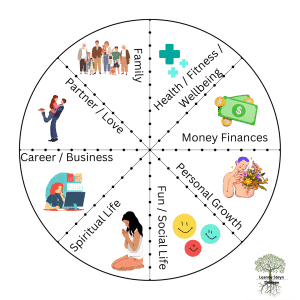Wellness has become a buzzword, but do we know how to achieve it? Our needs can change throughout life, so wellness isn’t fixed. Instead, it’s about meeting and balancing our physical, emotional, mental and spiritual needs, which differ between people.
There’s so much information out there that it can feel overwhelming to know where to begin. We are often bombarded with marketing messages around fitness, fad diets and other remedies that promise to make us healthy, but do these work for everyone?
They might work for some people, but for the average person juggling multiple responsibilities, achieving balance or focusing on themselves can seem challenging. For this reason, it’s essential to take a holistic approach to health and wellness.
In this post, we’ll discuss some areas you can look at in your life and some small steps to take to experience greater wellbeing.
Get an overview of your current state
Addressing any aspect of your life in isolation might feel overwhelming. However, tools like the Life Balance Wheel can help you gain perspective and identify imbalances that need addressing. This tool originates from the Wheel of Life concept that Paul J. Meyer, the founder of the Success Motivation Institute, developed.
As the name suggests, the Life Balance Wheel is a circular diagram with different “pieces” that make up the wheel, like a pie or a pizza. Each “slice” is an aspect of our lives that contributes to our sense of wellbeing.
These pieces include:
- Health, Fitness and Wellbeing
- Money and Finances
- Personal Growth
- Fun and Social Life
- Spiritual Life
- Career and Business
- Partner and Love
- Family

The idea is to rate your satisfaction in these areas, with one being low and ten being high. If you have areas with a lower score, you can start focusing on improving your life in this area. For example, if you’re scoring low on social relationships, you might want to make more of an effort to connect with friends, reach out to people or take up a new social activity.
You don’t need to feel pressure to reach 10/10. This tool is not about seeing where you’re going “wrong”; it is a map to see what small steps you can take to achieve your goals and feel better. Naturally, some parts of your life will score higher than others. The aim is not for all spheres of your life to have equal scores – the point is for you to assess how happy you are with the current balance in your life.
Prioritise your health
Focusing on physical health can be very beneficial in improving your score in any of the areas on the wheel. While medication and supplements can help, exercise, a balanced diet and sleep are essential building blocks for a happy and healthy life.
Improved nutrition not only helps you feel better but can also help you concentrate and feel more energised. Therefore, it’s vital to eat well, and once you have the basics in place, use further supplements to enhance your health.
Prioritising our health includes getting enough quality sleep, which few of us do! There are many ways to sleep better, but some suggestions include regular exercise, not looking at your phone right before bed, and establishing a wind-down routine, which can all help ensure you get enough rest.
Medication can be essential for managing certain health conditions, but fundamental nutrition ensures you only have to take what’s necessary. Many online resources can help, but you can also seek help from a qualified nutritionist for professional advice.
Develop self-care practices
Self-care can be any activity or practice that makes you feel good. Taking time to savour even the most minor daily rituals can make a big difference. Something simple, like enjoying your morning coffee, can help establish a nourishing daily routine that can help keep you going even during stressful times.
As we mentioned in the intro, creating a self-care plan involves addressing your physical, emotional, mental, and spiritual needs. These are personal, so there is no one-size-fits-all solution.
Reading a book, taking a long bath, and spending time in nature are other popular self-care practices that can enhance one’s well-being. However, deciding what specific activities and practices nourish you is your choice. It also takes trial and error to figure out what works. The aim is to strive for balance, not perfection.
Your wellbeing plan is flexible; you can regularly revisit and adjust it as you see fit. Keep it simple, and remember that any action can lead to a better habit!
Ground yourself
A scientific study shows that grounding, or skin contact with the earth, can help reduce inflammation and increase wellbeing.
Taking time to ground yourself is similar to self-care, but in this case, you physically connect to the earth. Walking barefoot, lying on the ground, and submerging yourself in water can all help you to feel more grounded.
Start a gratitude practice
Taking time to note what you are grateful for daily increases well-being. We often get caught up in thinking about everything we don’t have and forget to appreciate what we already do. This practice doesn’t have to be elaborate. You can simply jot down a few things you are grateful for before going to bed every night.
Develop greater self-compassion
Self-compassion is also an essential part of wellness. Punishing ourselves for not being perfect isn’t conducive to health, but it’s easier said than done. We often put so much pressure on ourselves to perform that we forget to be kind to ourselves.
Talk to a professional
Many people feel a stigma around reaching out for support with mental health struggles. There is a perception that asking for help is a sign of weakness when the opposite is true. Asking for help takes courage and is the first step to overcoming limiting beliefs and processing difficult and sometimes traumatic experiences that can affect our wellbeing.
You can also seek the help of a professional coach to enhance your life and provide guidance about setting and achieving goals. A coach can help you take what you have learned from putting together a Life Balance Wheel and break down what you need to do to improve your score in each area of your life.
Deal with Stress
Learning how to deal with stress can significantly help improve your wellness level. Finding practical tools to manage overwhelming stress is essential, especially when getting through the day becomes problematic.
Mindfulness, meditation, and deep breathing can help you manage stress. Setting boundaries is also vital to ensure you only take on what you can manage, for example, at work. Overcommitting and not delegating tasks can lead to enormous and often unnecessary stress.
Beyond finding practical tools for managing overwhelm, it’s also crucial to maintain a positive mindset. As simple as it sounds, wellbeing means finding and doing things you love. Laughing and connecting with people go a long way in managing stress!
Learn more about wellness with SACAP Global
If you’d like to learn more about incorporating a holistic approach to wellness, watch our webinar, Prioristing Wellness: A Holistic Approach to Mental Health, on our YouTube channel.
In this webinar, psychologist and SACAP lecturer Leanne Steyn explains how to approach well-being holistically, including using tools like the Life Balance Wheel.
SACAP Global also offers several online short courses that can help you improve your wellbeing in various ways, which include the following:
Mental Health
We offer three courses that focus on how to manage your mental health overall, as well as specialised courses in managing anxiety and depression.
Positive Psychology
Positive psychology is the study of how to be happier. In the following two courses, you can learn more about how to reach your full potential.
- Building Positive Self-esteem
- Developing a Growth Mindset
- The Art of Motivation: Empower Self & Others
Managing Stress
Burnout is a typical result of stress. In Understanding Burnout Through the Lens of Compassion, we provide more information on how to deal with burnout while being compassionate to yourself and others.
